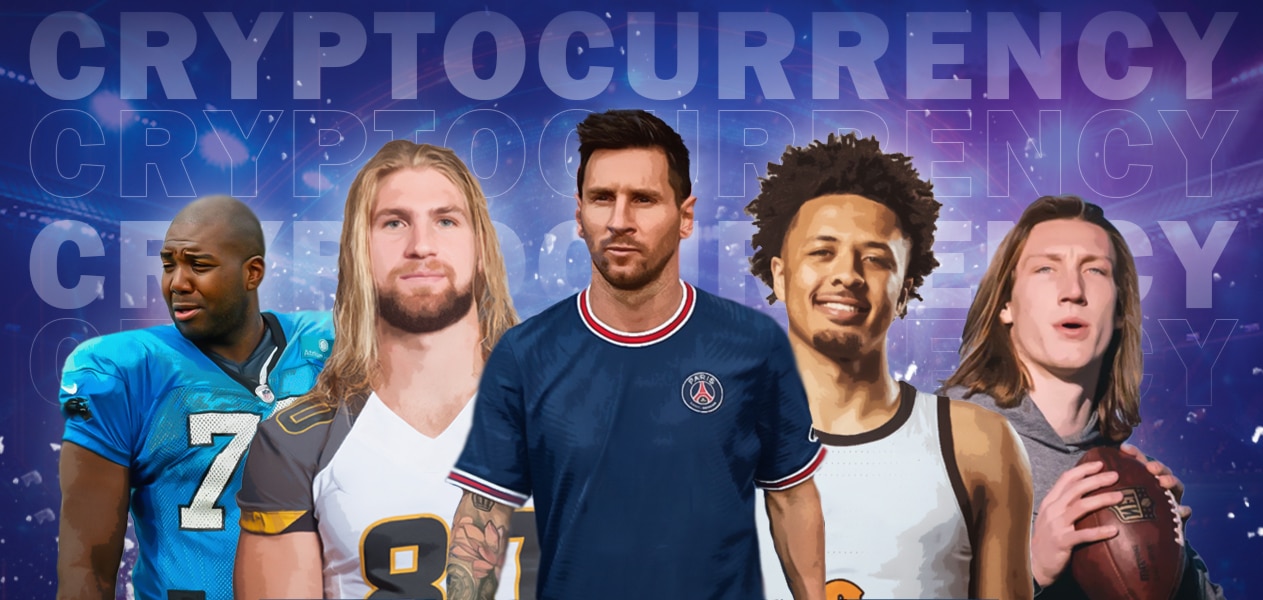Top athletes who are paid in cryptocurrency
Cryptocurrency and blockchain firms have realised the potential that sports as an industry has to bring in more investors and engage with a global market in ways that were unimaginable decades ago.
Although the COVID-19 pandemic halted proceedings all over the world bringing nations to a standstill, the sports industry responded and devised strategies to ensure clubs and fans remained connected in a socially distanced world.
But for digital currencies to continue that upward trajectory, they needed to expand the investor base. And by expanding, I mean less sophisticated investors willing to pump up the price of cryptocurrencies like Bitcoin, Ethereum, Dogecoin, and any other that is the flavour of the day.
And for that, crypto firms have identified athletes as the ideal target to bring in these less sophisticated investors. More often than not, in today’s day and age, the younger fanbase associates itself more with a particular player than a whole club. Because of this, we are seeing a new wave of athletes accepting crypto payments while encouraging their followers to do the same.
In this article, I bring to you five athletes who are ahead of the curve at least in their financial game and have adopted cryptocurrency as one for the future.
Russell Okung

A veteran of the game, former Seattle Seahawks offensive lineman Russell Okung has been playing in the National Football League (NFL) for over eleven years now. Back in 2019, Okung was one of the first athletes to come out forthright and ask to be paid in Bitcoin (BTC). On December 29, 2020, the veteran got his wish.
The Carolina Panthers eventually offered to pay half of Okung’s reported US$13 million salary in Bitcoin. However, it was not directly in Bitcoin: in partnership with Strike, Russell converted the US$6.5m into roughly 240 Bitcoins. A story, covered by journalist Scott Chipolina for Decrypt back in March, revealed that at the time of Okung’s payment in December 2020, Bitcoin’s dollar equivalent was roughly US$27,000, which had since jumped to US$59,000 (at the time of the story). Valued at US$59,000, Okung’s 240 BTCs were worth US$14.1m at the time – a whopping 118% increase.
At the time of writing, 1 Bitcoin is valued at US$63,409.50.
Leaving aside the US$7.6m return on investment, Okung’s average salary ranks him 14th among tackles in the NFL, and if you add on those US$7.6m he has made in the last three years, his ranking shoots up to 4th among tackles (both offensive and defensive).
Trevor Lawrence

Weeks before the 2021 NFL Draft started, Trevor Lawrence announced his deal with Blockfolio, a cryptocurrency app. According to Forbes‘ Chris Cason, Trevor would be paid for the deal in cryptocurrency, which was directly deposited in his account.
Moreover, the Jacksonville Jaguars picked Trevor Lawrence as their No. 1 overall NFL Draft pick. The rookie signed his contract with the team, which is expected to last for four years, with the option to extend it by a year. The Jaguars will be paying Lawrence around US$36,793,486. Additionally, he was also paid a signing bonus of US$24,118,900, most of which was converted to cryptocurrencies such as Bitcoin, Ethereum and Solana.
“We believe that Trevor is the future of football, and we think Crypto is the future of finance,” said Sina Nader, Blockfolio’s COO. “Trevor represents a lot of the promise and potential of football at the highest level, and we think that crypto represents the same thing at the highest level of finance,” he added.
Sean Culkin

Back in April 2021, the Kansas City Chiefs’ Sean Culkin became the 1st NFL player to convert his entire salary into Bitcoin. Culkin, who is vying to be a backup behind starter Travis Kelce, was paid his US$920,000 salary by the Chiefs in dollars, which in turn were converted into Bitcoin.
Culkin, 27, joined the Chiefs this past February on a reserve/future contract. He tweeted about his decision earlier, saying, “Bitcoin is the future of finance. I want to do this with the thought it would continue to rise over the long term.
“It’s going to have some large pullbacks and dips and people are probably going to say I’m crazy, but I’m focusing on the long term. Long term, it’s a stored value. What makes Bitcoin so intractable is its scarcity. Over time, it’s deflationary by nature. If you look at history, it appreciates over time.”
Cade Cunningham

Cade Cunningham is a 19-year-old freshman who established himself as a future star at Oklahoma State last season. A gifted 6’8″ point guard, Cade was named the Big 12 Player of the Year and Freshman of the Year after averaging an impressive 20.1 points, 6.2 rebounds, 3.5 assists and 1.6 steals per game for the Cowboys.
During the 2021 NBA Draft, the Detroit Pistons selected Cade Cunningham as the No. 1 overall pick. Moreover, having agreed on a multi-year partnership with cryptocurrency platform BlockFi, the rising star is set to receive his signing bonus from BlockFi directly in Bitcoin.
“I’m not playing basketball just for fun anymore,” Cunningham told ESPN. “It’s a business now, and that’s the blessing of it…Marketing myself, I want to be fully authentic with who I am. I don’t want to take any marketing deals that don’t match who I am.”
Lionel Messi

One of football’s greatest assets, Lionel Messi joined the crypto bandwagon when he called on his time at the Camp Nou and jumped ships to the French capital with Paris Saint-Germain (PSG). The 34-year-old’s move to PSG included a payment in cryptocurrency-based fan tokens.
PSG said in an official statement that the tokens included in Messi’s “welcome package” or signing-on fee had been provided by Socios.com, their official fan token provider. Although the club refused to state the amount or what percentage of the deal the tokens comprised of, many experts suggest that the value could be around US$25-35m.
PSG saw a high-volume trading of their fan tokens after reports of the Argentine’s move to the club emerged. “The hype surrounding the latest signings in the club’s busy summer transfer window created a huge surge of interest in $PSG Fan Tokens, with trading volumes exceeding US$1.2billion in the days preceding the move,” the statement said.


